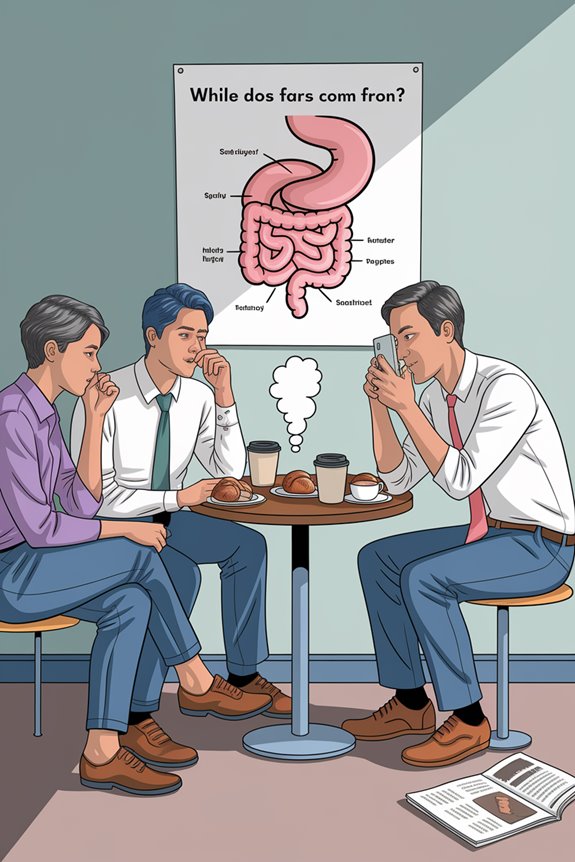
Farts are caused by gas that forms in your digestive system as food is broken down. Swallowing air while eating, drinking, or talking adds to this gas. Gut bacteria in your intestines also create gas by fermenting food your body can’t digest. Releasing this gas is a normal part of digestion. Your diet, gut bacteria, and how fast you eat all play a role in how much gas you make. There’s a lot more to learn if you want to dig deeper.
The Digestive Tract: Your Body’s Gas Highway

Every time you eat, your digestive tract gets to work, breaking down food and moving it through a winding path from mouth to anus. Along this journey, your body absorbs nutrients, but not everything gets used up.
Some food components reach your colon, where bacteria feast on them, leading to gas production. Gas buildup is normal during digestion; your body naturally needs to expel it.
The digestive tract acts like a gas highway, transporting these bubbles until they exit as farts. Paying attention to your digestive health can influence how much gas your body produces.
What Happens During Digestion

As soon as you take a bite of food, your body launches a complex process to break it down into usable parts.
First, chewing mixes food with saliva, which begins to soften and moisten it. When you swallow, the food moves down to your stomach, where strong acids and enzymes further break it apart.
These chemical reactions transform large molecules into smaller, more manageable pieces. In the small intestine, additional enzymes work to digest proteins, fats, and carbohydrates.
This is where your body absorbs essential nutrients into the bloodstream, leaving behind what can’t be digested.
The Role of Gut Bacteria in Gas Production

Once food reaches your large intestine, trillions of gut bacteria start breaking down what your body couldn’t digest.
As these bacteria consume leftover fibers and carbohydrates, they carry out bacterial fermentation. This process releases gases such as hydrogen, carbon dioxide, and sometimes methane—the main components of farts.
The types and amounts of bacteria in your gut influence which gases are produced and how much. Eating a balanced diet can help regulate the amount of fermentation happening in your gut.
How Air Gets Into Your System

As you eat, drink, or talk, you naturally swallow small amounts of air. This air moves down your esophagus into your digestive tract.
Breathing quickly or shallowly can also increase how much air you take in. Chewing gum, sipping through straws, or eating fast can add to the swallowed air.
Most of this air leaves your body as a burp, while some travels into your intestines. Eventually, trapped air exits as a fart.
The way you eat and breathe influences how much gas collects inside you.
Common Foods That Cause Flatulence

Certain foods play a big role in how much gas your body produces.
Beans are known for their fiber and protein, but they also have sugars that gut bacteria ferment, producing gas.
If you’re lactose intolerant, eating milk, cheese, or ice cream can lead to extra flatulence.
Drinks like soda and sparkling water add bubbles to your digestive tract, which often come out as gas.
Whole grains, though healthy and packed with fiber, can be tough to break down and may increase gas as your body digests them.
Why Some People Fart More Than Others

Although everyone passes gas, some people do so more frequently due to differences in diet, digestion, and gut bacteria. You might notice farting more than your friends, which is completely normal.
Individual differences in the digestive system can cause some people to naturally produce greater amounts of gas. Lifestyle habits also play a part. Eating quickly, chewing gum, or drinking fizzy drinks can cause you to swallow extra air and create more gas.
The foods you choose, your activity level, and even stress can all influence how much you fart compared to others.
What Determines the Smell of Farts

Because farts can vary so much in odor, you might wonder what actually causes the smell. The main contributors are gases like hydrogen sulfide and ammonia, which form when gut bacteria break down certain foods.
Foods such as beans, eggs, and broccoli often lead to more of these odorous gases. Each person has a unique mix of gut bacteria and dietary habits, so fart odors can differ widely.
Genetics also influence how your body processes food. Altogether, your distinct blend of bacteria, food choices, and genetic factors shapes the way your farts smell.
When Gas Signals a Health Issue

While passing gas is usually harmless, it can sometimes signal an underlying health issue if you notice sudden changes.
If you experience ongoing gas with severe bloating, abdominal pain, or unexpected changes in your usual habits, pay attention. These symptoms might point to digestive problems like irritable bowel syndrome, lactose intolerance, or celiac disease.
Take note if you also have weight loss, blood in your stool, or frequent diarrhea. Talk to your doctor about these concerns, as early detection can help you manage digestive disorders and protect your health.
Conclusion
Now you know where farts come from—they’re produced when your digestive system breaks down food, gut bacteria get to work, and you swallow some air. What you eat, the bacteria in your gut, and the speed at which you eat all influence how much gas you have and its odor. Farting is a normal part of digestion, but you should notice if anything suddenly changes. Passing gas simply shows your body is doing its job to keep you healthy!



